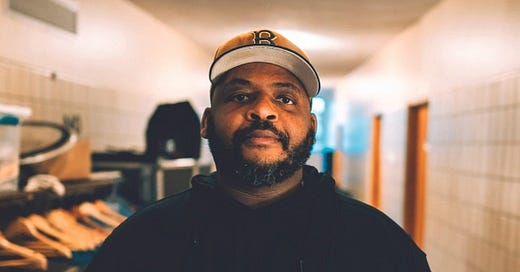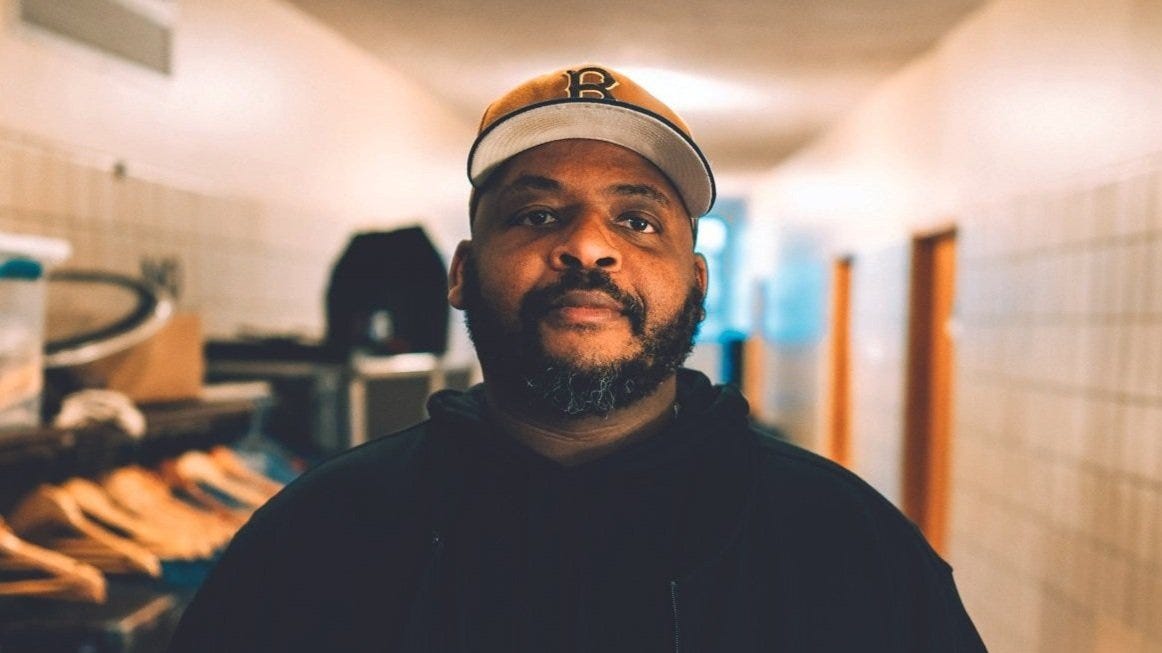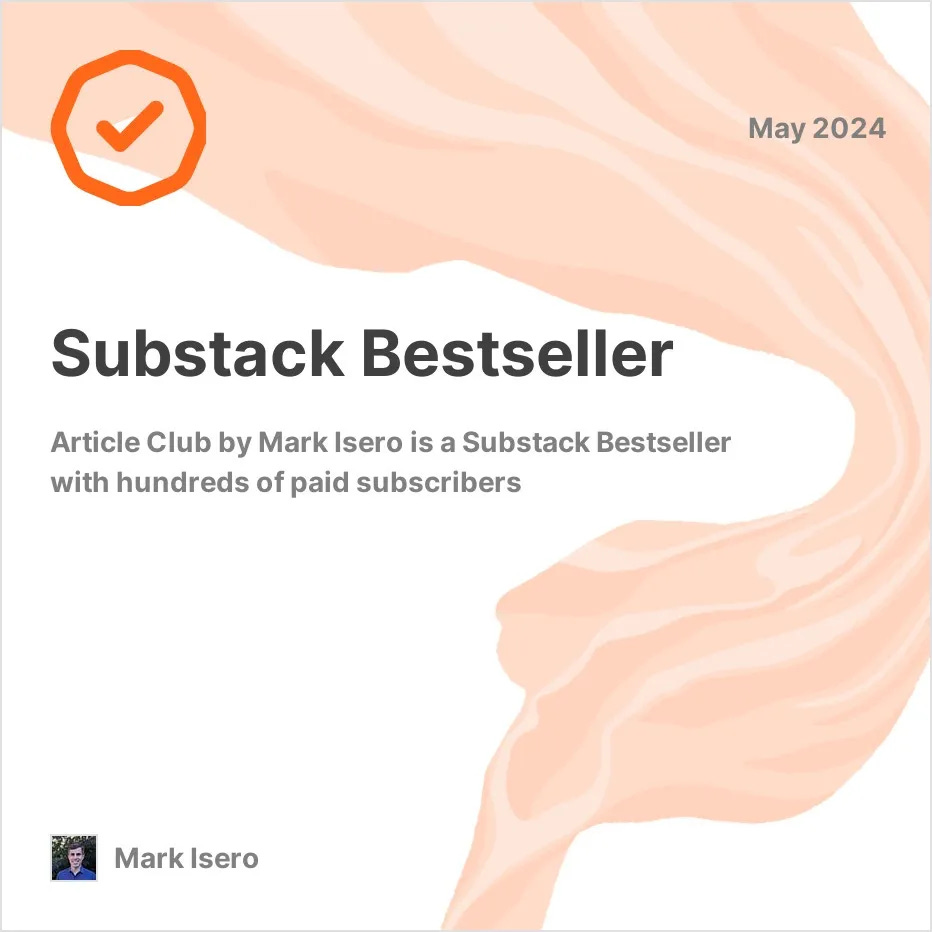#474: The Best Articles of 2024
My 3 favorites + your favorite + the best author, pet, interview, and issue of the year
Dear Readers,
Thank you for another great year. I’m grateful for your readership.
Now it’s time — for the 10th time! — to reveal my favorite articles of the year. In case you’re interested in how I chose them, the process was as follows:
I looked back through every article over the past 49 issues
I made a semifinalist list (see below), then re-read each article
Then some magic happened where I chose my favorites (usually using my gut)
I think you’ll appreciate my picks. For the first time ever, all three are personal essays. I don’t know if that speaks to a decline in traditionally reported journalism, or if the quality of personal essays has improved. Maybe it’s that I’m not looking hard enough in enough publications. Or maybe it’s just a trend in my personal reading tastes. Whatever it is, I stand behind my selections and urge you to (re)read them.
In addition to my three favorites, in this issue you’ll get:
The pet of the year
Your favorite article of the year
My favorite interview of the year
The author of the year
The issue of the year
Hope you enjoy today’s issue. If you do, let me know by writing a short note in the comments. I’d love to hear from you!
Last thing: I’ll be taking the next two weeks off, as usual. I’m wishing you all a restful holiday with plenty of space to rest and read. (If you read anything great, let me know!) See you back here the first Thursday of 2025. 🎉
1️⃣ Letter From Home
Kiese Laymon: “I do not want to disappoint God, Mississippi, or home with this letter, but I have to disappoint God, Mississippi, and home with this letter. I am currently succumbing to evil.
“I do not believe in guns. I do not believe in prisons. I do not believe in killing. But in that moment, I wanted to kill that police officer and his family in about 16 different ways. And I partially wanted to kill him because he had less money than me.
“While I do not believe in guns, prisons, or killing, I wholly believe in the power of words to build, blur, humiliate, and destroy.
“I refuse to believe that the height of human being, which is really the act and art of being human, in this nation, is our capacity to kill, to incarcerate, to systemically humiliate, to discipline or to own people most efficiently. I believe that the height of human being in Mississippi, in New York, in Gaza, in Israel, in Sudan, everywhere on Earth, can be our ability to atone, restore, share, and vigorously accept when we have succumbed to evil.”
By Kiese Laymon • Bitter Southerner • 6 min • Gift Link
2️⃣ Masculinity: The Abstract Rage To Protect
“There is a difference between a man’s sense of protection and a man’s sense of violence,” a male friend once reassured me. But I never could tell the difference.
When Amanda E. Machado tells men that she was once sexually assaulted at a festival, with her ex-boyfriend nearby but lost in the crowd, they instantly become ashamed of him. “How could he let this happen?” they ask. “He was supposed to protect you.”
In this enlightening essay, Ms. Machado explores notions of masculinity, weaving personal experiences with the work of Phil Christman, a lecturer at the University of Michigan. Mr. Christman writes, “When I try to nail down what masculinity is — what imperative gives rise to all this pain seeking and stoicism, this showboating asceticism and loud silence — I come back to this: Masculinity is an abstract rage to protect.”
The biggest problem with this “abstract rage to protect,” Ms. Machado argues, is that there is a fine line between a desire to protect and a desire to inflict violence. “The aggression men learn to protect the women they love, becomes exactly how they hurt the women they love.”
By Amanda E. Machado • The Adroit Journal • 15 mins • Gift Link

3️⃣ Athens, Revised
When she was 26, Erin Wood was on the last leg of a trip to Greece. On the afternoon before her flight, a man approached her, offered her a free tour of the Acropolis, a recommendation to a quality hotel, a meal, and a drink. Early the next morning, Ms. Wood woke up in her hotel bedroom, naked from the waist down, her body heavy, her sheets wet. “What have I allowed to happen?” she asked.
In this article, Ms. Wood explores the answer to that question. At first, she considers two versions of what happened. She writes two narratives. They both don’t feel right. Then, after unhelpful couples therapy with her unhelpful husband, she realizes that she’s been asking herself the wrong question. One night, unable to sleep, Ms. Wood reads an essay online about a woman who survived a serial killer. “What if I am not alone?” she asks. This new, revised question — it’s the one.
4️⃣ Reader’s Choice: The Friendship Problem
Rosie Spinks is a millennial mom living in London. This means we’re in no way alike. But the way she writes about friendship — it resonated deeply with me. And I have a feeling her essay will do the same with many of you.
Ms. Spinks explores what’s changed with modern friendships and why she feels less interested in making plans. It’s tiring, she writes:
It seems normal now that plans are made far in advance — scheduled around myriad travel and wedding weekends and kids and work commitments — and then canceled right before. Someone doesn’t follow up, or cancels and then never proposes an alternative plan. Similarly, promising new adult friendships never seem to blossom into the kind of quotidian check-ins and week-to-week ephemera that the friendship of our younger years is based on. Life-long friends make new life choices, drift apart. The friendship fizzles into WhatsApp volleys back and forth, and then someone doesn’t answer the last message, and then it’s a year before you ever talk again.
Has any of this happened to you? (For me, all of it.)
But instead of blaming motherhood, or the pandemic, or inflation, Ms. Spinks explores the “matrix of factors” that figure into the friendship burnout she’s experiencing. For guidance, she turns to Esther Perel (maybe we all should?), who explains that hyperconnectivity is to blame. “People have easily 1,000 virtual friends,” Dr. Perel says, “but no one they can ask to feed their cat.”
What to do, then? It’s time to remember our childhoods, Ms. Spinks suggests, especially as late-stage capitalism atomizes us into our lonely fiefdoms. It’s time to “play freely on the street.”
By Rosie Spinks • What Do We Do Now That We’re Here • 13 min • Gift Link
💬 Other Bests and Favorites
➡️ Best Author: Beth McMurtrie
You know you’re pretty good when you get three articles published in Article Club in the same year. Even though I wasn’t too happy with education writing overall, I was very pleased with Ms. McMurtrie’s reporting and clear writing. She knows what people are talking about in education and how not to oversimplify or sensationalize. Check out “Is This The End of Reading?” “Customers in the Classroom,” and “Cheating Has Become Normal.” They’re all solid pieces.
➡️ Favorite Interview: Mike Hixenbaugh
It’s a privilege to get to interview such kind and generous authors, month after month. Every single conversation is thought provoking. But some interviews just click. That was the case with Mike Hixenbaugh, author (along with Antonia Hylton) of Southlake. I appreciated Mr. Hixenbaugh’s energy, his honesty, and his no-nonsense reporting. If you haven’t read his book, They Came for the Schools, it’s a great one. If you missed my interview with Mr. Hixenbaugh, here it is.
➡️ Best Issue
There’s a big debate happening at Article Club (at least among a few of you!) about which is better: (1) classic issues, where there’s a wide selection of articles about different topics, or (2) themed issues, where all the articles center on a common topic. This year’s best issue (and most popular) ended up being a themed issue, which explored the origins and impacts of misinformation. Here it is.
Thank you for reading this week’s issue. Hope you liked it. 😀
To our 21 new subscribers — including Katarzyna, Dion, Dori, Richard, Aubrey, Adam, Dominick, Stacey, Avni, Melissa, Renda, Brittany, Erin, Sara, Barbara, Myrtle, Susanne, and Basheer — I hope you find the newsletter a solid addition to your email inbox. Welcome to Article Club. Make yourself at home.
Paid subscribers, thank you for making Article Club a bestseller back in May. Your support is extremely appreciated.
If you appreciate the articles, value our discussions, and in general have come to trust that Article Club will have better things for you to read than your current habit of scrolling the Internet for hours on end, please consider a paid subscription. I am very appreciative of Wanda, our latest paid subscriber. Thank you!
If subscribing is not your thing, don’t despair: There are other ways you can support this newsletter. Recommend the newsletter to a friend (thanks Symone!), leave a comment, buy me a coffee, or send me an email. I’d love to hear from you.
On the other hand, if you no longer want to receive this newsletter, please feel free to unsubscribe below. See you in 2025!










Honored my piece was your readers' choice! Thank you for featuring it.